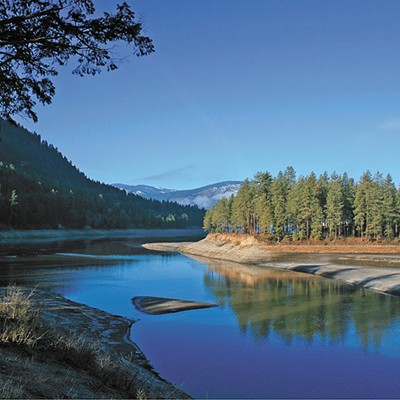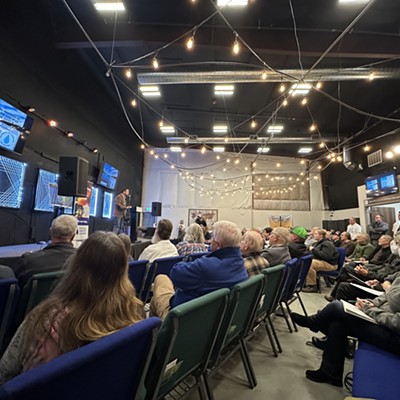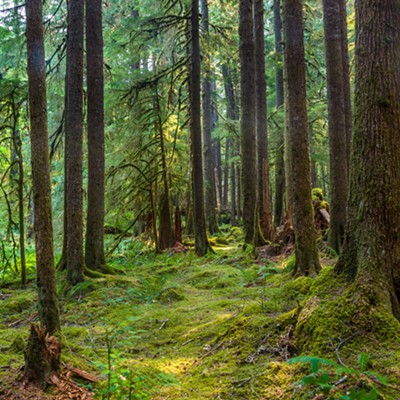Ask Mary Verner how it feels to see state and federal governments pushing sustainable, green-friendly politics and a broad, twinkling smile creeps across her face. Is she excited? “Absolutely,” she says.
Verner, who ran for mayor of Spokane in 2007 promising to make the city more sustainable and position it as a hub for green industry, has reason to be excited. Last month, Gov. Chris Gregoire and Senate Democrats unveiled proposals to create green jobs, develop a cap-and-trade system for greenhouse gas emissions and make electric cars a viable transportation solution. In Washington, D.C., President Barack Obama ordered the reversal of federal orders relaxing the rules on vehicle emissions and mercury pollution, while Congress continued to hammer out details on a stimulus package full of green incentives and inducements.
“We are so excited about the possibility of bringing in some stimulus dollars,” Verner told The Inlander this week. She says the city has looked at changing the way it irrigates its parks, replacing motors in pumping stations to make them more energy efficient and switching to more hybrid vehicles in the city’s fleet. “If we had stimulus money, we could do that,” she says.
But Verner points out that she hasn’t exactly been sitting on her hands, waiting for other politicians to help her deliver on campaign promises. Last week, the initial findings and recommendations of Verner’s Sustainability Task Force were presented to the City Council in a study session. The effort involved nearly 600 people, mostly from the public. The project yielded about 500 ideas for making the city more sustainable, most of which have been grouped under eight themes, including conserving water and energy, promoting clean mobility and enabling optimal land use. Those will work their way through the council before being presented publicly in a month or two, says city spokeswoman Marlene Feist.
In addition, Verner points to a lot of little actions. She’s rid City Hall’s vending machines of bottled water. She directed city fleet drivers to not let their cars and trucks idle. The city has given its employees free bus passes and put in 12 scooter and motorcycle parking spaces throughout downtown. Verner also facilitated a contest to see which department could come up with the most ideas for sustainable practices.
“We’ve made [sustainability] a priority. That’s bullet point No. 1,” Verner says. “All these little things we’ve done are really not that little. We’ve tried to lead by example. The city government’s behavior is improving and changing.”
Indeed, workers inside City Hall have mentioned a culture change since Verner took over. But all these little things haven’t exactly added up to the green hub Verner foresaw during the elections yet, either. The city and Greater Spokane Incorporated are wooing a handful of businesses, she says, but she doesn’t elaborate further, pivoting instead to the green assets Spokane already has. “We are already a hub — it’s just not well known,” she says, as if being a hub is a matter of simply saying you’re a hub. “We’re trying to make it known.”
To that end, she says, the city is aggressively marketing its environmental reputation, hosting green-themed events, selling stories to “national publications,” even partnering with China to bring some of the city’s energy technology to Asia. Verner also sells Spokane heavily in a starring role in Evergreen, a documentary produced by the Washington Clean Tech Alliance to showcase the state’s work in the environmental field. The film also featured cameos from five other Spokane industry and business leaders.
“There were a lot of deep breaths taken by people on the west side, because there was so much said about Spokane,” Verner says of the film’s November premiere in Seattle. “‘It’s not just a cowboy town? Why is Spokane being featured in this film?’”
Verner says that kind of exposure is key to attracting more green business. It could also come in handy when stimulus dollars are being parceled out — particularly at a time when every city wants to claim green credentials. “Other cities are green-washing. I read the trade journals. They’re tooting their horns about a recycling program,” Verner says with a shrug of mock disbelief. “We’re more than a recycling program.”




















